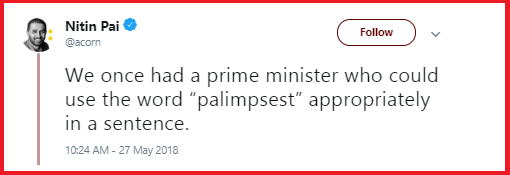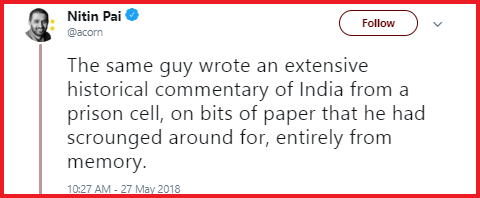This is Nitin Pai, the Director of Takshashila Institution. Presumably an educated Indian of the 21st century, with no real reason to carry an inferiority complex.

For the record, I have absolutely no freaking idea what ‘palimpsest’ means. However, I can use it appropriately in a sentence. Here’s how. Let me show you.
Anybody who judges Prime Ministers by their ability to use the word ‘palimpsest’ is very likely an idiot.
Now Nitin Pai’s elitism, festering along with his colonial inferiority complex, is so obvious in the tweet that we barely need to mention it separately. But, Nitin Pai is not important here. What is important is to note that there *still* exists a constituency, even among well educated and presumably well-travelled urban Indians to bow in reverence before those who use big English words.
Three observations are in order.
(1) First, what does this say about our country 70 years after independence? How much bigger is this constituency among lesser privileged people in India who make the vast majority? Is that not a frightening thought?
(2) Second, if this is the impact of Nehru’s big English words in India of 2018, can you imagine the impact it had on people in the 1950s and 60s? Does this explain the generations of historians who have venerated the Nehru-Gandhis?
(3) The third is a question I have always wanted to ask of historians, hagiographers and other intellectuals. What is it about English proficiency that it is venerated as a marker of intellectual ability? Why not proficiency in some other subject, say Math?
I know that big words is the subject of this article, but I could not bring myself to move on without showing you Nitin Pai’s next tweet.

What? Scrounged around for bits of paper? Written entirely from memory? The level of gullibility in this tweet would give competition to disciples of Baba Ram Rahim.
A simple google search would reveal that the British even built Nehru and his friends a special badminton court in jail premises. How foolish would you have to be to think that he would “scrounge” around for paper … and that he would actually find 1000 pages of paper while “scrounging” around, or that he would write 1000 pages on history from memory?
Believe it or not, I am not mocking Nehru here. I am glad the British treated him well in prison. I am mocking his gullible followers who think he was capable of superhuman feats. What is next? The great Nehru, like dear leader Kim Jong Un, learned to fly an aeroplane by scanning the manual for a few seconds?
Back to the topic of big words. If you ask me, language is about communication. Language is a living breathing thing. If my words fly over your head, then I am not speaking to you, I am talking at you. That might be ok for devotees like Nehru used to have/still has, but it is a misfit for the young, irreverent and aspiring India of the 21st century.
At the same time, language is also a marker of status and culture, a way to indicate place in society, and a way for societies to record their history. Preserving the beauty and subtlety of a language becomes a way to preserve culture.
Here is where I have noticed an obvious double standard of Indian liberals. You will notice their desire to “cheapen” Hindi (and most other Indian languages) whereas they advocate for the highest standards for the Queen’s English … and Urdu.
When it comes to English and Urdu, you will see Indian liberals discard all their interest in the “language as a means of communication,” along with all their preference for simpler words that everyone can understand. Nowhere is this more apparent than the absolute bullying that Chetan Bhagat receives from the literary community. Why? Because Bhagat’s English is peppered with Hindi words and often shows scant respect for the Queen’s grammar.
But when the same arguments for high grammar and purist choice of words are applied to say Hindi, the literary liberal performs a U-turn. The proponents of say “Shudh Hindi” are then painted as regressive, closed-minded and deserving of ridicule.
Let me give you an example from this India Today discussion on the Hindi language with the ultimate man of words: Javed Akhtar Saab.
Here you will see (watch from 12:50) as Javed Akhtar frowns and then bashes the poor anchor for using a simple Hindi word “ushma (ऊष्मा)” (warmth), demanding a “simpler” word in its place. According to him, any effort to use “pure” words like ‘ushma’ will choke our Indian languages to death.
If you ask me, ‘ushma’ is a fairly simple word and most Hindi speakers would know its meaning. But this is not about the word, this is about the attitude. Where are the liberals who insist on the ability to use the English word ‘palimpsest’ in a sentence? How many Indians know the meaning of ‘palimpsest’. I’ll bet many many more Indians understand ‘ushma’.
But ‘ushma’ is a Hindi word. ‘Palimpsest’ comes from the Queen’s language. That’s the big difference.
There’s author Anuja Chauhan on the panel as well, who jumps in (watch from 15:10) to explain just how terrified she is of being judged by people who speak ‘Brahmanical Hindi’. First of all, how out of touch does an English speaking liberal have to be to give a sob story about the fear of being looked down upon for poor Hindi speaking skills? Does she know how many crores of young Indians across the heartland are scared to share their ideas because they fear being mocked for their halting English?
Secondly, what’s with Hindi being called ‘Brahmanical’? Does language have a caste? How would liberals react if somebody were to say that Urdu is Islamic?
It again boils down to the double standards. Shudh Hindi (or any Indian language except Urdu) is to be bashed and despised, its vocabulary is to be shunned and it is to be vilified with religious and caste tags. But high brow words in English and Urdu are desirable status markers and don’t you dare connect Urdu to the Muslim community.
Here are some lyrics penned by Javed Akhtar for the mass market Bollywood movie Jodha Akbar:
“In Lamhon Ke Daaman Mein
Pakiza Se Rishte Hain
Koi Kalma Mohabat Ka
Dohrate Farishte Hain
Khamosh Si Hai Zameen Hairaan Sa Falak Hai
Ek Noor Hi Noor Sa Ab Aasman Talak Hai
Nagmein Hi Nagmein Hai Jagti Soti Fizaon Mein”
And to think he threw a fit over the use of the Hindi word ‘ushma’! Presumably all of us common folk use phrases like “Pakiza se rishte” in our daily lives. How many people know what ‘pakiza’ means Javed Saab? How many people use words like ‘falak’ and ‘talak’ and ‘noor’ and ‘daaman’ and ‘nagmein’ in our daily lives? How come you would use such words in a Bollywood song?
Ultimately, what makes a language or a word living or dead is whether it is used. Why makes Javed saab push a word like ‘pakiza’ into circulation but frown on the word ‘ushma’? Why the need to resurrect words such as ‘palimpsest’ or ‘farrago’?
The liberal double standard is not about making the language more open or closed. It is about creating two different castes among languages. English and Urdu are to be the high-status languages. Hindi, Bangla, Gujarati, Punjabi, Tamil, Telugu, etc are supposed to occupy the low rung. The agenda is obvious.



